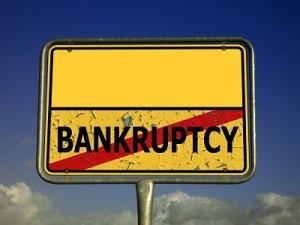Does the Automatic Stay Continue in a Reopened Bankruptcy Case Ninth Circuit
 When a trial date looms, bankruptcy may look better and better to a defendant.
When a trial date looms, bankruptcy may look better and better to a defendant.
Bankruptcy can be the emergency exit from a bad situation that is about to get worse.
That's because every bankruptcy case comes with an automatic stay . That's a federal court injunction automatically entered when a bankruptcy case is filed, protecting the debtor and his property.
What does that mean, really, when the stay is imposed while litigation is underway?
Stay halts suit against debtor
The stay stops all parties from continuing the lawsuit in any way against the person who has filed bankruptcy.
The stay is in force, whether or not anyone has received notice of the bankruptcy.
Debtor's counsel usually wants to notify all parties of the filing, long ahead of any notice of the bankruptcy case that may go out from the bankruptcy court clerk. Some courts have a form used to provide notice to the court of the stay.
If someone goes ahead with actions against the debtor in violation of the stay, those acts are void or voidable. (In the 9th Circuit, it's "void") . So if a foreclosure sale takes place after the stay is imposed, the sale is void and of no legal effect.
Deliberate actions in violation of the stay expose the actor to damages, including punitive damages and attorneys fees.
The debtor's damages include attorneys fees to stop the violation and collect those fees and damages.
Stay in Chapter 13 protects co debtors
If the lawsuit involves a consumer debt, anyone who is jointly liable with the debtor is protected by the stay when the debtor chooses Chapter 13.
A consumer debt is defined as "debt incurred by an individual primarily for a personal, family, or household purpose." § 101(8)
Even though the co debtor didn't file bankruptcy themselves, they get this protection because it's seen as protecting the debtor as well.
The co debtor stay can be lifted by a motion for relief from the stay if the Chapter 13 plan doesn't propose to pay the debt in full.
Suit may continue against others
Other defendants in business cases often hope that the bankruptcy of one of the defendants will stop the suit all together.
Sometimes, a filing has that effect for a while, as the trial court and the parties try to sort out what to do next. But the injunction created by the bankruptcy court actually protects only the debtor.
The suit in a non bankruptcy court may proceed against other defendants. The debtor may be required to appear as a non party witness in the suit as it resumes, but absent relief from the stay, the debtor is shielded.
Most courts hold that non bankruptcy actions can continue against corporations or other artificial entities owned by the debtor, even though a successful case against the debtor's corporation may impair the value of the debtor's asset and therefore impact the debtor's bankruptcy case.
Trying multi-party actions including the debtor
Strategically, those suing the debtor may want to avoid going forward with the suit, with the debtor's chair at the defendant's table empty. After all, one of the first things we learned in law school was to fill up all the chairs with those potentially liable.
Two options are available. Litigants can seek to remove the suit to bankruptcy court under 28 U.S.C. 1441 and try the claim in bankruptcy court or the district court.
Alternatively, litigants can seek relief from the automatic stay to try the case against the debtor and his codefendants, under the condition that any judgment obtained at trial be returned to bankruptcy court for enforcement.
Dischargeability not an exception to the stay
Even creditors whose claims are not dischargeable in bankruptcy must respect the automatic stay. There is no exception just because you know, or hope, that your claim will survive the bankruptcy.
There is a long list of actions not within the scope of the stay, found in subsection b of 362, headed by carve-outs for criminal matters; family law actions for paternity and status; tax assessments (but not collection).
Discharge provides permanent injunction
The automatic stay terminates when property is no longer "property of the estate". The protection of the debtor and his assets, current and future, is replaced by the discharge injunction.
So, unless the claim you are prosecuting before bankruptcy against the debtor is non dischargeable, you are not free to resume suit against the debtor once the discharge is entered.
How to proceed
Most state court judges have been conditioned to hold hard when there is a suggestion of bankruptcy. Restarting a pending suit against remaining defendants is often facilitated by seeking an order granting relief from the automatic stay, or a "comfort order" that there is no stay that prevents continuation of litigation.
More
Chapter 13 rescues debtor
What to do when you're sued
When bankruptcy is the right choice
Image courtesy of Geralt and Pixabay
Source: https://www.bankruptcysoapbox.com/bankruptcy-stay-lawsuit/
0 Response to "Does the Automatic Stay Continue in a Reopened Bankruptcy Case Ninth Circuit"
Post a Comment